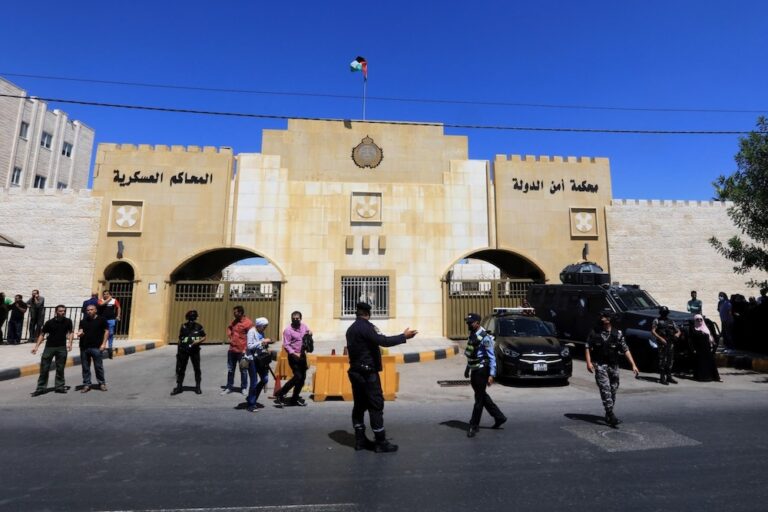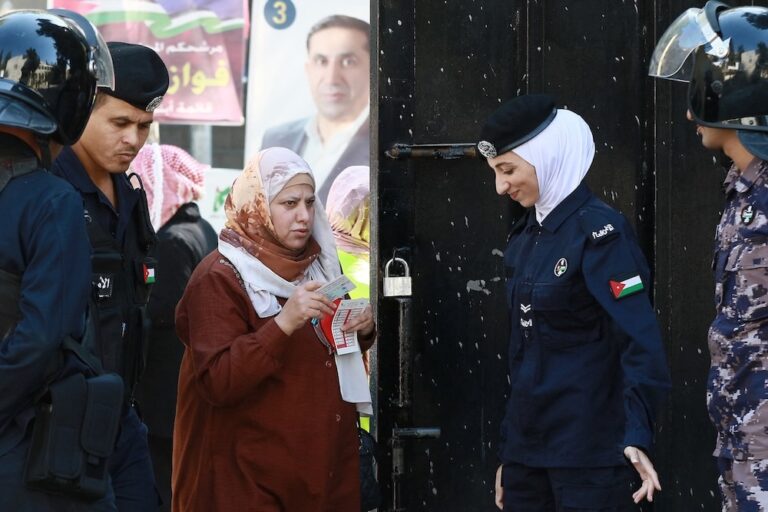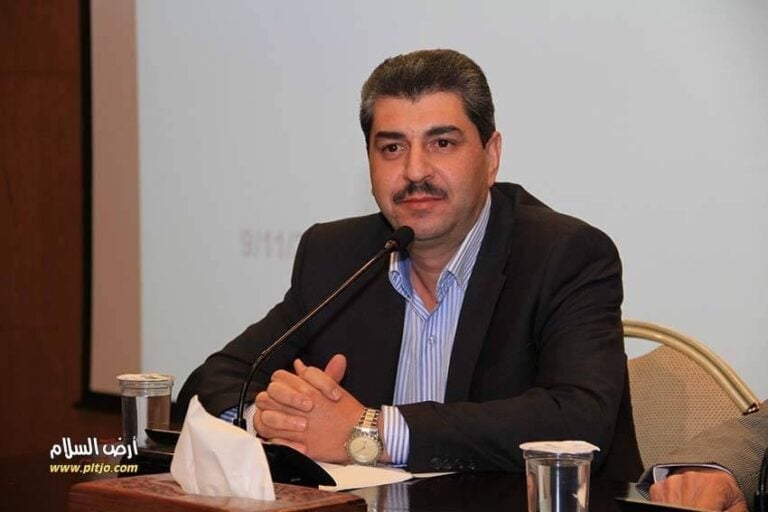(HRW/IFEX) – In a 9 July 1998 letter to Jordanian Minister of Higher Education, Dr. Mohammad Hamdan, made public on 13 July, the Human Rights Watch Academic Freedom Committee criticizes the draft press and publications law currently being considered by the Jordanian parliament. The letter, signed on behalf of the committee by Jonathan F. Fanton, […]
(HRW/IFEX) – In a 9 July 1998 letter to Jordanian Minister of Higher
Education, Dr. Mohammad Hamdan, made public on 13 July, the Human Rights
Watch Academic Freedom Committee criticizes the draft press and publications
law currently being considered by the Jordanian parliament. The letter,
signed on behalf of the committee by Jonathan F. Fanton, President of the
New School for Social Research in New York, calls on the Minister to convey
the committee’s concerns to other government leaders in Jordan.
**This press release is further to IFEX press release/action of 7 July
1998**
The letter assails three aspects of the proposed law: first, its requirement
that all books and other publications be submitted to the ministry of
information for pre-publication review; second, its requirement that
universities, which are nominally exempt from the censorship provisions of
the proposed law, obtain “prior permission” from the ministry before
ordering foreign books which might violate the law; and third, a provision
of the law which would forbid independent research and polling
institutes from accepting “any financial assistance or support” from foreign
sources.
“The law would be a disaster for researchers and scholars in Jordan,” said
Joseph Saunders, an academic freedom specialist at Human Rights Watch who
works with the committee. “It is hostile to the free flow of ideas and
hostile to the expression of
controversial viewpoints. As such, it is incompatible with the most basic
principles of research and scholarship.”
A copy of the letter follows:
July 10, 1998
His Excellency Dr. Mohammad Hamdan
Minister of Higher Education
Kingdom of Jordan
Amman, Jordan
Your Excellency:
We are writing this open letter on behalf of the Human Rights Watch Academic
Freedom Committee to express our grave concern about the draft press and
publications law currently being considered by the Jordanian parliament. As
a group of scholars and academic leaders who are committed to opposing
restrictions on academic freedom and protecting the basic rights of
educators worldwide, we believe that the proposed legislation, if enacted,
would violate international human rights law and have far-reaching,
deleterious consequences for academic and intellectual life in Jordan. We
respectfully urge that you convey the concerns of the Academic Freedom
Committee outlined in this letter to other members of the executive branch
as well as to the parliamentarians now considering this legislation.
Although the draft law is directed primarily at newspapers and other mass
media publications, it also contains provisions applicable to independent
research institutes and polling centers. The broad censorship provisions of
the draft law, moreover, would apply to all printed materials, including
periodicals and books, whether published in Jordan or imported. As set forth
below, we have three primary concerns about the draft law.
First, the draft law requires that copies of all books and publications be
submitted to government authorities for pre-publication screening, and
grants broad authority to the
director of the press and publications department within the ministry of
information to outlaw the circulation of such works (Articles 36, 42). The
draft law sets forth fourteen separate censorship categories, using vague
language that would effectively empower the director to ban any work which
he or she deems adverse to the interests of, among others, the King and
royal family, the Jordanian armed forces and security forces, the judiciary,
religions or religious sects recognized in Jordan, the national currency, or
foreign states with which Jordan is on friendly terms (Article 42). The
discretion conferred on the
director by the open-ended censorship provisions would make the law an
effective tool for intimidation and control of critics, a consequence which
already has been the subject of pointed criticism from some Jordanian
observers.
Second, although the law makes an exception for foreign publications
imported by government agencies, universities, and scientific research
centers, it requires that such institutions obtain “prior permission” from
the Ministry of Information before importing potentially controversial
books and writings, and that they set aside any such works in “special
places for the use of scientific research” (Article 38). Because of the
vague language of the censorship provisions, academics and university
officials will have to guess which books might violate the law, and this
inherent uncertainty can be expected to create endless difficulties. Because
controversial publications will be available only in designated locations
within universities, moreover, the law will have a substantial chilling
effect on the use of such publications even among those who in principle
have access to them. Most importantly, however, the exception would not
protect the rights of academics as citizens to share their views, ideas, and
research findings openly with members of the broader public. The ability to
share information and ideas and contribute to public debate without fear of
reprisal is an essential component of academic freedom. Academics do not
exist in a social or political vacuum, and the commitment to free and
open exchange of ideas and information that is the foundation of academic
life does not end at the campus gates.
Third, the draft law would impose onerous requirements on independent “study
and research centres and polling centres.” It would strictly forbid such
institutes and their employees from “receiving any financial assistance or
support from any non-Jordanian party”, and would allow the director of press
and publications to order the closure of any institute that violates the
policy for up to six months. (Article 46) The draft defines the term “study
and research centre” broadly to include any “institution that carries out
research and provides consultations in political, social, economic,
anthropological and cultural domains;” it defines “polling centre” as any
“institution that carries out research, the aim of which is to survey public
opinion trends.” The ban on foreign funding would have devastating
consequences for a wide range of independent institutes engaged in research
and policy analysis, including political think tanks, environmental
protection societies, and medical and social service NGOs. If interpreted
literally, these provisions also could be used to shut down foreign
institutes based in Jordan such as the French Centre for Research on the
Study of the Contemporary Middle East, the American Centre for Oriental
Research, and even entities such as UNESCO and the Fulbright Commission. In
addition, the draft law provides for steep fines for any institute that
violates the ban (Article 53).
In closing, we hope that you share our concerns about the fundamental
incompatibility of the draft law with respect for independent research,
inquiry and expression, and that you are able to convey them to your
colleagues in the Jordanian government.
Thank you for your consideration of this important matter. We look forward
to hearing
from you at your earliest convenience.
Sincerely yours,
Jonathan F. Fanton
President, New School for Social Research
Co-Chair, Human Rights Watch Academic Freedom Committee
HUMAN RIGHTS WATCH ACADEMIC FREEDOM COMMITTEE
The Human Rights Watch Academic Freedom Committee aims to monitor, expose,
and mobilize concerted action to challenge threats to academic freedom
worldwide, and to foster greater scholarly and media attention to the
critical role played by higher education in the development and preservation
of civil society.
When teachers, researchers and students are harassed or imprisoned for
exercising their rights of free expression and inquiry, when their work or
research is censored, when access to educational institutions is restricted
on discriminatory grounds, or when universities and schools are closed for
political reasons, the committee responds by publicizing the abuses in the
media and in the academic community, sending protest letters to appropriate
government officials, and uniting concerned organizations in coordinated
campaigns for effective international action.
The Human Rights Watch Academic Freedom Committee is composed of
twenty-eight university presidents and scholars. Its co-chairs are Jonathan
Fanton of the New School for Social Research, Hanna Holborn Gray of the
University of Chicago, Vartan Gregorian of the Carnegie Corporation, and
Charles Young of the University of California at Los Angeles.


